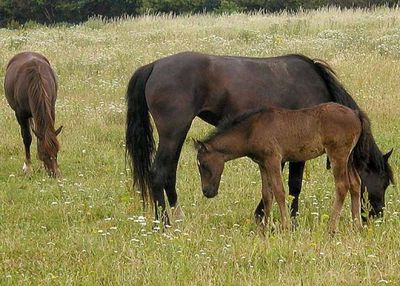Allergic Dermatitis is an inflammation of the skin caused by an irritant. It can be treated and/or controlled, especially once the cause is known.
Hives (Urticaria) are usually caused by insect bites, sometimes by reactions to drugs. Horses appear to develop hives more often than other species. While hives can be seasonal, horses living in warm climates are prone to them all year.
Your veterinarian will treat the hives as needed with medicated shampoos, ointments, antihistamines or corticosteriods. Try to limit the horse’s exposure to insects: use insect repellents (check for safety to use on horses); use coverings such as a fly sheet, mask, leg wraps when horse is outdoors; supplement with omega fatty acids; keep horse away from stagnant or other water except for drinking, manure, cattle.
Contact Sensitivity will cause sores on the area of contact. There can be reactions to saddles, plants, grasses, etc. Treatment is frequent bathing with a mild soap, ointment to stop itching and treat sores.
Atopy is an environmental sensitivity. Irritants can be grasses, trees, plants, dust, pollen, fabrics. Signs are hair loss, thickened skin, scaly, crusty areas, abrasions, skin redness.
Your veterinarian may perform allergy tests to discover the cause of Atopy. Treatment can include antihistamines, corticosteriods, allergy injections, omega fatty acids. Once the allergen is found, it’s important to avoid it and prevent the condition.
Some horses may have food allergies, not through ingestion, but through body contact with food. Removing the culprit will solve the problem.
Consult with your vet to determine cause and treatment of allergic dermatitis.

